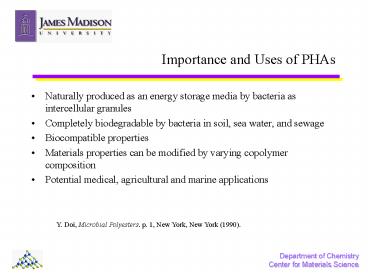Importance and Uses of PHAs - PowerPoint PPT Presentation
1 / 13
Title:
Importance and Uses of PHAs
Description:
Naturally produced as an energy storage media by bacteria as ... Connie Rossini. Sean Ramirez. Adora Christenson. Mike Flythe (Biology - Bridgewater College) ... – PowerPoint PPT presentation
Number of Views:46
Avg rating:3.0/5.0
Title: Importance and Uses of PHAs
1
Importance and Uses of PHAs
- Naturally produced as an energy storage media by
bacteria as intercellular granules - Completely biodegradable by bacteria in soil, sea
water, and sewage - Biocompatible properties
- Materials properties can be modified by varying
copolymer composition - Potential medical, agricultural and marine
applications
Y. Doi, Microbial Polyesters. p. 1, New York, New
York (1990).
2
Structure of Poly-3-hydroxyalkanoates
Y. Doi, Microbial Polyesters. p. 100-101, New
York, New York (1990).
3
Comparison of PHAs to Polypropylene
4
Biodegradable Plastics
Bottles Made of P(3HB-3HV)
L. Madison, G. Huisman, Microbiol.and Molec.
Biol. Rev., 63, 21 (1999)
5
Intercellular Granules
200 nm
PHA Inclusion Bodies from Pseudomonis putida
mm
6
Atomic Force Microscopy (AFM)
- Lateral Resolution 1 nm
- Height Resolution 0.1 nm
- Scan size To 120 mm
7
P(3HB-3HV) Thin Film As-Deposited
- Average spherulite size approx. 3.5 mm
8
Cross Sectional Analysis of Spherulite Boundaries
9
2.5 Hour Biodegradation (Streptomyces
Preparation)
10
Different Enzymes, Different Mechanisms?
Comamonis
Streptomyces
11
Conclusions
- Ex-situ Experiment
- Measured biodegradation of P(3HB-3HV) thin films
- Degradation occurs preferentially at spherulite
boundaries in Comamonis. This is due to an -OH
terminus and a more open lamellar structure of
amorphous hydroxyvalerate region (?) - Very different degradation mechanism in
Streptomyces. Much faster degradation of entire
surface. - Soft Lithography
- Patterned PHA thin films using SAMIM and MIMIC
- Preliminary data suggests self aligned deposition
on m-CP surface - Different microstructure of patterned surfaces.
We would expect different degradation kinetics
12
Future Work
- Purify and concentrate different enzymes
- Kinetics and mechanism of different enzymes
- Ex-situ biodegradation as a function of
temperature - Self aligned deposition is preferred
- In-situ experiment using standard height and
liquid cell of AFM
13
Acknowledgements
Collaborators Dr. Doug Dennis (Biology -
JMU) Dr. Stephen Barron (Biology - Bridgewater
Collge) Charles Dimovitz (Fork Union Military
Academy, NSF-RET) Dr. Chris Hughes (Physics -
JMU) Dr. Noel MacDonald (Mats Sci Eng. - UCSB)
Undergraduates Evan McCarney Connie Rossini Sean
Ramirez Adora Christenson Mike Flythe (Biology -
Bridgewater College) Brian Hall (Biology - JMU)
Funding ACS Petroleum Research Fund (Grant
33989-B5) NSF-REU Grant 97-31912 NSF-RUI
(Pending, Division of Materials Research,
Polymers Program) NSF Research Experiences for
Teachers 1999 MRS Undergraduate Materials
Research Initiative 2000 JMU CSM Faculty
Assistance Grant (1999) Photolithography
Equipment Donations Dr. Eugene Irene (UNC) MCNC
(Research Triangle Park, NC)































